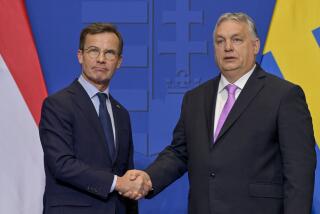Sten Andersson, 83; Former Swedish Foreign Minister and Middle East Peace Negotiator
- Share via
Sten Sture Andersson, who as foreign minister of Sweden played a vital role in persuading Yasser Arafat to utter the “magic words” that satisfied Washington’s demands to end its 13-year diplomatic boycott of the Palestine Liberation Organization, has died. He was 83.
Andersson died Sept. 16 of apparent heart failure in his native Sweden, according to news reports from Stockholm.
On Dec. 14, 1988, Arafat delivered a carefully crafted statement at a news conference in Geneva. The statement accepted two United Nations resolutions on the Middle East, renounced terrorism and affirmed the right of all parties in the conflict, including Israel, to exist “in peace and security.”
Hours later in Washington, Secretary of State George P. Shultz pronounced Arafat’s statement acceptable in meeting U.S. conditions that had been in place since 1975. That same day, President Reagan authorized the opening of a “substantive dialogue” with the PLO. The first U.S.-PLO meeting came two days later in Tunisia.
Those involved said Andersson was the crucial figure in the final hours leading up to Arafat’s historic news conference. That morning, he was closeted with the PLO leader and his two top aides for two hours. “He told Arafat that he must read out this statement clearing up the ambiguities,” a junior Swedish diplomat recalled at the time.
Until then, in the U.S. view, Arafat had failed to address the issues head on, sidestepping them again in a much-anticipated address the day before at a meeting of the U.N. General Assembly in Geneva. The session was moved there after Shultz denied Arafat a visa that would have allowed him to address the assembly in New York.
Through the days leading up to the U.N. speech, there were reports that intermediaries had given Arafat the exact language, the “magic words,” that would satisfy Washington and end the diplomatic boycott.
In an 80-minute address delivered in often-flowery Arabic, Arafat “condemned terrorism in all its forms” and proposed a three-point Mideast peace plan.
The PLO thought Arafat had aced the speech and that an agreement was in the bag. But in the U.S. view, Arafat had failed to deliver.
One of the sticking points was the condemnation of terrorism, which was less than the full renunciation of terrorism that the U.S. wanted from him in a public statement. In his news conference, Arafat satisfied that demand by saying, “I repeat for the record that we totally and absolutely renounce all forms of terrorism.”
Andersson, Shultz told The Times recently, “created language for Arafat that helped satisfy our demands.”
“He worked at it and got Arafat to say the magic words,” Shultz said.
The end to the U.S. boycott marked a diplomatic victory for Andersson, one he had worked throughout the year to achieve.
Andersson had visited Israel, the West Bank and Gaza in early 1988 and was alarmed at the violence by the Intifada, the Palestinians’ uprising against Israeli forces, and vowed to become actively engaged in trying to find a solution. One of the keys was bringing the U.S. into the process.
According to the Jerusalem Post account of his diplomatic efforts, Andersson believed early in the process that he needed to convince Arafat and the PLO “to play out what they had long claimed was their only card -- a statement that they had to recognize Israel’s right to exist and renounce terrorism. I stressed over and over that for things to progress they had to play that card as soon as possible.”
During a visit to the United States by the king and queen of Sweden in April 1988, Andersson met in Washington with Shultz and outlined an approach to get the PLO and the U.S. talking again. Shultz apparently was noncommittal to the approach, which Andersson took as a tacit yes.
Andersson also believed that hosting American Jewish leaders in private talks with PLO leaders could be helpful.
Los Angeles philanthropist Stanley K. Sheinbaum headed the American Jewish delegation to the informal meetings, which were held in Stockholm, Paris and England.
Sheinbaum said the talks were centered on the idea that the Intifada was doing nobody any good -- not Israel and certainly not the PLO.
“Andersson was very important to the process,” Sheinbaum told The Times last week. “He acted as a go-between and was present at each of the meetings.”
From the talks, the PLO signed a letter recognizing statehood for Israel and disavowing violence, Sheinbaum told The Times. That letter was sent on to Shultz in Washington.
The next step would be Arafat’s declaration of the “magic words.”
Born in Stockholm on April 20, 1923, Andersson worked for the Swedish post office while a student at the University of Stockholm. He spent most of his career in the country’s Social Democratic Party apparatus. He served in Parliament for three decades and as the country’s social affairs minister before being named foreign minister in 1985, a post he held until 1991.
Over the years, Andersson was described as colorful, engaging and lively, and had accumulated vast experience in negotiating during his two decades as leader of Sweden’s Social Democratic Party.
He was “a delightful guy, fun and constructive,” Shultz told The Times.
Andersson was in a long line of Swedes who had played a role in mediating Middle East issues. The list included Count Folke Bernadotte, who was the U.N. mediator in Palestine in 1947-48, and Dag Hammarskjold, the U.N. secretary-general who used personal diplomacy during the Suez Canal crisis in 1956.
*
More to Read
Sign up for Essential California
The most important California stories and recommendations in your inbox every morning.
You may occasionally receive promotional content from the Los Angeles Times.










